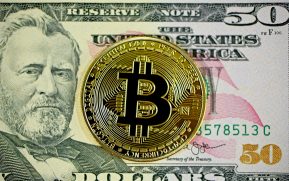
The Crime Report (https://thecrimereport.org/2023/01/18/arguments-continue-in-sec-v-ripple/)
Image via WIkimedia Commons
The high-profile case between the Securities and Exchange Commission and blockchain company Ripple Labs, Inc. has received renewed media attention lately and appears to be moving toward a decision. Rumors previously circulated suggesting a decision might be reached by mid-December, but as of the time of writing, no decision has been made.
Ripple, along with current CEO Bradley Garlinghouse and Christian Larsen, former-CEO and board chair, were charged with violations of the Securities Act of 1933 in 2020.
Ripple is known for the blockchain token XRP. The central legal question at play in SEC v. Ripple Labs is whether or not XRP can be defined as a traditional “investment contract.” The answer to this question may have far-reaching implications for the cryptocurrency industry in general, and the civil and criminal regulation of that industry nationwide.
The ongoing battle between the two parties over certain documents related to respective summary judgment motions is of particular recent significance. Arguments continue over the admissibility of the so-called “Hinman documents,” which reference a 2018 speech when a SEC Division Director described certain cryptocurrencies as not being securities.
To determine if a financial instrument qualifies as an investment contract and thus a security, both regulators and those in the crypto industry look to the precedent established in the1946 landmark Supreme Court case SEC v. W.J. Howey Co.
William J. Howey owned large tracts of Florida citrus groves. He sold these to various customers, who were then offered the opportunity to lease the land back to Howey’s company.
The Howey Company then grew and harvested citrus fruit on the land, sold it on behalf of the owners and shared the profits with them. However, Howey failed to register this business with the SEC, which prosecuted him accordingly.
The Supreme Court ruled in favor of the SEC, resulting in the “Howey test,” still used today to determine whether a financial instrument can be considered an investment contract.
The four-pronged Howey legal test requires that the instrument be: an investment of money, in a common enterprise, with the expectation of profit and to be ‘derived from the efforts of others.’
Joshua White, a former financial economist for the SEC, told The Crime Report that the Howey test is the “gold standard” at the SEC when determining if something is a security.
“If it’s a security, they need to register with the SEC or find some sort of exemption from registering,” White said. “The crypto view is, ‘Hey, this isn’t a security, it’s a commodity.”
In SEC v. Ripple, the SEC argues that cryptocurrencies ought to be defined as investment contracts under the precedent established by Howey. Ripple, meanwhile, would have its blockchain tokens, XRP, ruled as outside the definition in Howey and, therefore, not subject to the same regulations.
Omid Malekan, a professor at the Columbia Business School and author of “Re-Architecting Trust: The Curse of History and the Crypto Cure for Money, Markets, and Platforms,” argues that the industry needs to be regulated in its own context, taking into consideration the recent invention of cryptocurrencies and their unique characteristics. Howey was decided nearly 80 years ago, when the legal and financial landscape of the country looked very different.
“It doesn’t make any sense to regulate [cryptocurrencies] based on a law passed at a time when many people in America did not have a telephone,” Malekan said.
Two potential differences between cryptocurrencies and traditional financial instruments defined in Howey may lie in the fourth prong of the test: “derived from the efforts of others.”
“The idea [with traditional financial instruments] is that the investors are very removed from running the activity,” Malekan said. “They need protections like investment contract laws. Alternatively, if the people providing the capital are also directly involved in running the thing, they’re more like an operator and don’t need the same protections.”
The international nature of cryptocurrency introduces another wrinkle for would-be regulators.
Malekan warns that “trying to shoehorn these very global projects, including XRP, into just U.S. laws” could lead to “very negative consequences.”
In recent months, public discourse about cryptocurrency has been dominated by the disastrous collapse of exchange FTX and the prosecution of its disgraced former CEO, Sam Bankman-Fried. Bankman-Fried, often referred to simply as SBF, is currently facing eight federal charges including wire fraud.
While the FTX fiasco may have blighted public perception of the industry as a whole, legally speaking, SBF’s alleged crimes pertain only to FTX, and don’t necessarily reflect on the rest of the industry.
“My view is FTX is sort of what I think about as plain vanilla fraud,” Joshua White said. “Crypto’s what their business model was, but the things SBF is alleged to have done—which is not separating the trading wall, using clients’ accounts, cash balance—you can just insert ‘banking’ there and that’s fraud.”
On the other side of the coin, for some in the cryptocurrency industry, the SEC’s slow response to Bankman-Fried’s alleged fraud inspires a lack of confidence in the regulatory agency.
“I think [the FTX collapse] affects the SEC, particularly Chairman Gensler’s reputation,” Malekan said. Gary Gensler was nominated to head the SEC in 2021. He previously taught at MIT and advised MIT’s Digital Currency Initiative. “A lot of people in this industry are saying that what turned out to be one of biggest frauds in American history was the one thing that the SEC had no problem with, and never went after.”
“Now the SEC is suing everyone and going after FTX and Bankman Fried and everything, but it’s clearly too little too late,” Malekan said.
Regardless of which way the court ultimately rules, the Ripple decision could lead to new legislation and may shape the regulatory climate around cryptocurrencies for years to come.
Ripple CEO and named co-defendant Brad Garlinghouse spoke to CNBC’s Arjun Kharpal at the Davos World Economic Forum on Wednesday and condemned the SEC’s attempt to categorize cryptocurrencies like XRP as securities. He told Kharpal that he believes the law is on Ripple’s side.
“I think the SEC’s behavior in some of it has been, I would say, embarrassing as a U.S. citizen,” Garlinghouse said.
A New York defense attorney known for his notorious cases where he went up against federal prosecutors, including one where he scored a mistrial for John “Junior” Gotti Jr during a 2009 murder case, died Thursday.
Your email address will not be published.
The Supreme Court announced on Friday they will hear an appeal to a conviction for online stalking in a case that involves the First Amendment. A number of sentences and charges for cyberstalking and related offenses have been announced so far during Stalking Awareness Month, many including charges of attempted extortion and blackmail.
In Safari Club International v. Bonta, three gun advocacy organizations argue that a California law violates their First Amendment right to free speech. The law prohibits marketing firearms and related products to minors.
NYPD officer Baimadajie Angwang was charged two years ago for allegedly acting as an agent on behalf of the Chinese government. Now, a judge has been asked to dismiss the case against him.
Jones pleaded guilty after the FBI received a complaint that he had created ricin with the intent to kill his former partner.
In addition to the 16-year-old already charged with several crimes, police are looking for two other suspects.
Justice Digest
© Copyright 2023, The Crime Report
Built with the Largo WordPress Theme from the Institute for Nonprofit News.
Back to top ↑
 How To Make Huge Profits In A Short Time With Crypto
How To Make Huge Profits In A Short Time With CryptoGet detailed training system that shows an absolute beginner (without any skill) how to make huge profits in a short time with crypto.
 Crypto + NFT Quick Start Course
Crypto + NFT Quick Start CourseThe #1 course for profit in the Crypto & NFT world - You will discover the secrets that 99% of people don’t know yet






